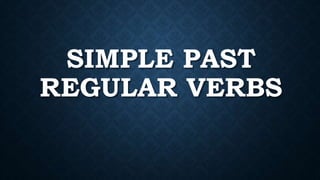Grammar: Simple past (Regular verbs)
- 3. USE ’āśThe Past Simple expresses a past action that is now finished. ŌĆóWe played football yesterday. ŌĆóI visited Paris in 2013.
- 4. USE ’āśThe Past Simple expresses a past action that is now finished. ŌĆóWe played football yesterday. ŌĆóI visited Paris in 2013.
- 5. SPELLING
- 6. ŌĆóAdd ŌĆśedŌĆÖ to the verb: ŌĆóStart ŌåÆ started ŌĆóFinish ŌåÆ finished ŌĆóVerbs ending with ŌĆśeŌĆÖ, add just ŌĆśdŌĆÖ ŌĆóArrive ŌåÆ arrived ŌĆóSurvive ŌåÆ Survived
- 7. ŌĆóPut the following verbs in the simple past: Add either ŌĆśdŌĆÖ or ŌĆśedŌĆÖ. ŌĆóAccept ŌåÆ Accept ŌĆóAdd ŌåÆ Add ŌĆóAdmire ŌåÆ Admire ŌĆóAdvise ŌåÆ Advise ŌĆóAfford ŌåÆ Afford ŌĆóAgree ŌåÆ Agree
- 8. ŌĆóPut the following verbs in the simple past: ŌĆóAccept ŌåÆ Accepted ŌĆóAdd ŌåÆ Added ŌĆóAdmire ŌåÆ Admired ŌĆóAdvise ŌåÆ Advised ŌĆóAfford ŌåÆ Afforded ŌĆóAgree ŌåÆ Agreed
- 9. ŌĆóVerb ends in ŌĆśyŌĆÖ, change ŌĆśyŌĆÖ to ŌĆśiŌĆÖ and add ŌĆśedŌĆÖ ŌĆóCry ŌåÆ cried ŌĆóStudy ŌåÆ studied ŌĆóOne vowel verb, double the consonant ŌĆóStop ŌåÆ stopped ŌĆóBeg ŌåÆ begged
- 10. ŌĆóPut the following verbs in the simple past: Grab ŌåÆ Employ ŌåÆ Plan ŌåÆ Empty ŌåÆ Copy ŌåÆ Dry ŌåÆ
- 11. ŌĆóPut the following verbs in the simple past: Grab ŌåÆ Grabbed Employ ŌåÆ Employed Plan ŌåÆ Planned Empty ŌåÆ Emptied Copy ŌåÆ Copied Dry ŌåÆ Dried
- 12. ŌĆóPut the following verbs in the simple past: Examine Examined Travel Rescue Investigate Deliver Seat Construct Listen
- 14. FORM ŌĆó Question ŌĆó The question in the Past Simple is formed with did. I arrive? When did He/she/it We You They














